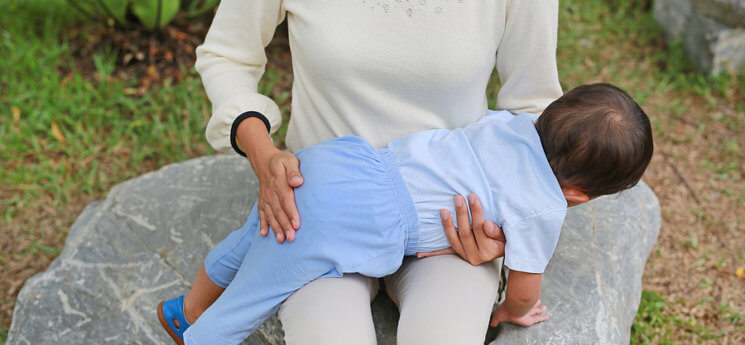Spanking a child is a controversial subject. Should you or shouldn’t you? Some studies say it’s OK, while others say spanking could have negative, long-term effects on your child.
We spoke with Barbara Nicholson and Lysa Parker, authors of the book Attached at the Heart: 8 Proven Parenting Principles for Raising Connected and Compassionate Children, to give us some insight into the history of spanking, and whether or not parents should ever use it as a method of discipline.
What’s the history behind spanking? Whoever thought it was a good or effective idea?
Violence against children (and that includes spanking) has been around since recorded history but not in all cultures. Even today there are many modern and hunter-gatherer cultures that shun violence of any kind, especially toward children. These same cultures have a long history of peace and some have been identified by anthropologists such as the Balinese, the !Kung San of South Africa and Yequana of South America, to name a few.
In 1979 Sweden banned spanking, making it illegal for parents or schools to use as well as other forms of corporal punishment. Rather than using punitive measures against parents the Swedish government made it an educational campaign and it’s working very well. This is an idea that is catching on worldwide where most countries have banned the use of corporal punishment in schools and several have banned its use in the home.
When a child is spanked, what happens to them emotionally?
Often children don’t understand why someone they love and who loves them would want to spank or hit them. When a parent spanks, a child can have a range of emotions from shock, fear, despair, and anger. These strong feelings are usually never resolved but contained only to manifest later in inappropriate behavior and stronger emotions. One example is the increase of bullying in schools. Bully’s are often physically and emotionally abused at home. They take their anger to school and release on children they view as weak and vulnerable.
Sadly, many toddlers are spanked, smacked or hit on a regular basis as a means of teaching them boundaries, “Don’t touch that!” or “ I told you not to get near the street!” When parents spank and then tell the child that they did it out of love, it can become very confusing. They learn to equate love with pain and violence. Every time we hit our children we weaken our bond with them and their emotional connection to us.
What are the negative consequences of spanking?
The negative consequences of spanking are many and supported by a wealth of research studies including the most recent one from Tulane University that studied the effects of spanking on 2,500 children. At the very least, frequent spankings at the age of three caused children to be more aggressive by the age of five. Others studies have showed reduced cognitive development and learning. A parent-child relationship based on fear only serves to interfere with a child’s optimal development cognitively and emotionally.
Numerous other studies have found a correlation between corporal punishment and delinquency, antisocial behavior, depression and suicide. The negative consequences extend from the family into our general society. The main point is that spanking doesn’t work in the long run and it only teaches children that “might makes right” and that violence is used to solve problems.
When a child does something that needs immediate punishment (such as biting his sibling), what should a parent do INSTEAD of spanking?
First of all, we need to rethink how we view punishment as our only discipline strategy. The word “discipline” comes from the root word “disciple” which we know means to learn from. What do we want our children to learn from an incident like biting his sibling. If we spank them, we are in effect teaching them to return a hurt for a hurt. If we stay calm and remove them from the situation and teach them a strategy to deal with their anger/frustration, we are educating them about how to handle incidents like this in the future. We often forget to include our children in the problem solving, too! We are trying to teach them how to be empathic, how to feel the other child’s feelings, and take responsibility for their actions.
When we ask our child, ‘do you like to be bit, of course they will say “No!” When we ask them why, they might say “It hurts…it makes me cry…it makes me mad, etc.” Then we can ask them what to do when they are so angry they want to bite, it’s amazing what they will say! Often they come up with better ideas then we would, like “go bite a pillow” or “come get you mommy” or “run around in the back yard until I feel better.” Isn’t that what we want our children to do?
They may have a perfectly reasonable reason to be angry-a sibling may have hit them, taken away a favorite toy, etc. but teaching our children to deal with their anger is key for a lifelong conversation about dealing with negative situations. When we continue with this strategy as they get older, it’s amazing to see them teaching it to others! Ultimately we want our children to behave, even when we’re not around to control the situation!
What are some of the most effective methods of punishment?
Again, let’s change our thinking from punishment to discipline…helping them learn self control, empathy, and effective tools for handling negative situations. One of the most effective methods or strategies for this is modeling empathic, active listening in infancy, and continuing this through the toddler years and beyond.
“Be the change you want to see in the world” is a tall order for parents, yet by modeling how to handle stress, redirecting a toddler to a different activity, making ‘time-outs’ a true opportunity to re-group, calm down, and work through a tantrum or sibling issue, will pay off in the long run!
Is there ever a time where spanking is warranted?
After raising six sons between us, we learned that spanking was NOT an effective tool, ever! It actually backfires when you are trying to teach your children not to hit, because it’s so obvious we are not practicing what we preach! It also backfires when you are in a dangerous situation, like your child runs in the street. It’s like punishing a child for crawling when they’re not old enough to walk!
It is our job to protect a child from dangerous situations, show them that we are scared if they run in the street, and explain that they will not be allowed to play near the street until they are old enough to understand the dangers. They may not like having safe boundaries, cry and complain, etc. but it’s our job as parents to create those safe boundaries until they are developmentally ready for more freedom.
If we can change our attitude from “this is an opportunity to punish” to “this is an opportunity to set a clear boundary and educate” then we are setting the stage for teaching responsibility, accountability for our actions, and ultimately raising our children to be adults that have the capacity for positive problem solving skills.
When we have children and adults that have deeply encoded the capacity for empathic, non-violent solutions, we are creating adults with a highly developed conscience, the foundation for a more peaceful society.
About the Authors:
Barbara Nicholson, M Ed, is co-founder of Attachment Parenting International (API). For fifteen years she served as President of the Board of Directors of API. Barbara has a Masters of Education degree specializing in learning disabilities and has been a breastfeeding and parent support group facilitator for over 27 years.
Lysa Parker (Lisa), MS ,CFLE, received her bachelor’s in education and her master’s degree in human development and family studies. She earned her designation of Certified Family Life Educator (CFLE) from the National Council on Family Relations in 2004. As cofounder of Attachment Parenting International (API), she served as the executive director for thirteen years, focusing on program development, public relations, and fundraising.




